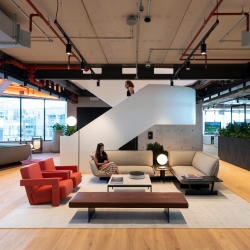To provide the best experiences, we use technologies like cookies to store and/or access device information. Consenting to these technologies will allow us to process data such as browsing behaviour or unique IDs on this site. Not consenting or withdrawing consent, may adversely affect certain features and functions.
The technical storage or access is strictly necessary for the legitimate purpose of enabling the use of a specific service explicitly requested by the subscriber or user, or for the sole purpose of carrying out the transmission of a communication over an electronic communications network.
The technical storage or access is necessary for the legitimate purpose of storing preferences that are not requested by the subscriber or user.
The technical storage or access that is used exclusively for statistical purposes.
The technical storage or access that is used exclusively for anonymous statistical purposes. Without a subpoena, voluntary compliance on the part of your Internet Service Provider, or additional records from a third party, information stored or retrieved for this purpose alone cannot usually be used to identify you.
The technical storage or access is required to create user profiles to send advertising, or to track the user on a website or across several websites for similar marketing purposes.
![]() The British Chambers of Commerce (BCC) has released new figures suggesting that over two thirds (66 percent) of businesses surveyed now offer flexible working to employees. The data, from a survey of over 900 businesses conducted in April 2021, also shows nearly three quarters of businesses expect to have at least one employee working remotely over the coming year, with the average expectation among those firms being just over half of their employees working remotely. (more…)
The British Chambers of Commerce (BCC) has released new figures suggesting that over two thirds (66 percent) of businesses surveyed now offer flexible working to employees. The data, from a survey of over 900 businesses conducted in April 2021, also shows nearly three quarters of businesses expect to have at least one employee working remotely over the coming year, with the average expectation among those firms being just over half of their employees working remotely. (more…)






 Research from
Research from 


 When it comes to conversations about work and workplaces, the past year has offered a fully immersive experience. Everybody now has an opinion. Inevitably some of them are better informed and more rooted in experience than others. So, after a full year of talk and as we return to some form of routine working life, the time has come to take stock. Few organisations and people will remain untouched by the sudden shift in attitudes towards working life, so we asked four workplace experts for their views on the current state of play.
When it comes to conversations about work and workplaces, the past year has offered a fully immersive experience. Everybody now has an opinion. Inevitably some of them are better informed and more rooted in experience than others. So, after a full year of talk and as we return to some form of routine working life, the time has come to take stock. Few organisations and people will remain untouched by the sudden shift in attitudes towards working life, so we asked four workplace experts for their views on the current state of play. 
 A shift to remote working in the pandemic has made starting a new job even more challenging and the Government must recognise the vital role managers have to play as it works to ensure the success of its £2.6 billion job drive.
A shift to remote working in the pandemic has made starting a new job even more challenging and the Government must recognise the vital role managers have to play as it works to ensure the success of its £2.6 billion job drive. 
 The workspace innovator
The workspace innovator 
 We’re all biased. We all recognise the sharp bump of our critical thinking skills kicking into life when confronted with ideas and information that go against our beliefs. We know how they doze in the comforting embrace of affirming data. So, it’s been entertaining this week to observe the reaction to
We’re all biased. We all recognise the sharp bump of our critical thinking skills kicking into life when confronted with ideas and information that go against our beliefs. We know how they doze in the comforting embrace of affirming data. So, it’s been entertaining this week to observe the reaction to 
 More than a third (37 percent) of US and UK office workers describe the prospect of going back to the office as the equivalent of going out to meet with friends, according to a new study by
More than a third (37 percent) of US and UK office workers describe the prospect of going back to the office as the equivalent of going out to meet with friends, according to a new study by 
 Has working at home during lockdown made people
Has working at home during lockdown made people 


 Half of Britain’s workers expect their bosses to demand a vaccine passport before they can return to their
Half of Britain’s workers expect their bosses to demand a vaccine passport before they can return to their 








June 1, 2021
Real Estate, HR and Technology leaders must collaborate to create a future of work fit for the 21st Century
by Philip Nye • Comment, Property, Technology, Workplace, Workplace design